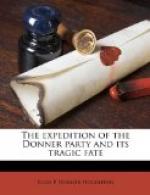The pinto colt he had promised me was, as Leanna had said, “big enough to kick, but too small to ride,” and I at once realized that my anticipated visits could not be made as planned.
Occasionally, men came on horseback to stay a day or two, and before the summer was over, a young couple with a small baby moved into one part of our house. We called them Mr. and Mrs. Packwood and Baby Packwood. The mother and child were company for my sister, while the husbands talked continually of ranches, cattle, hides, and tallow, so I was free to roam around by myself.
In one of my wanderings I met a sprightly little Indian lad, whose face was almost as white as my own. He was clad in a blue and white shirt that reached below his knees. Several strings of beads were around his neck, and a small bow and arrow in his hand. We stopped and looked at each other; were pleased, yet shy about moving onward or speaking. I, being the larger, finally asked,
“What’s your name?”
To my great delight, he answered, “Name, Billy.”
While we were slowly getting accustomed to each other, a good-natured elderly squaw passed. She wore a tattered petticoat, and buttons, pieces of shell, and beads of bird bones dangled from a string around her neck. A band of buckskin covered her forehead and was attached to strips of rawhide, which held in place the water-tight basket hanging down her back. Billy now left me for her, and I followed the two to that part of our yard where the tall ash-hopper stood, which ever after was like a story book to me.
The squaw set the basket on the ground, reached up, and carefully lifted from a board laid across the top of the hopper, several pans of clabbered milk, which she poured into the basket. Instead of putting the pans back, she tilted them up against the hopper, squatted down in front and with her slim forefinger, scraped down the sides and bottom of each pan so that she and Billy could scoop up and convey to their mouths, by means of their three crooked fingers, all that had not gone into the basket. Then she licked her improvised spoon clean and dry; turned her back to her burden; replaced the band on her forehead; and with the help of her stick, slowly raised herself to her feet and quietly walked away, Billy after her.
Next day I was on watch early. My kind friend, the choreman, let me go with him when he carried the lye from the hopper to the soap fat barrel. Then he put more ashes on the hopper and set the pans of milk in place for the evening call of Billy and his companion.
[Illustration: PAPOOSES IN BICKOOSES]
[Illustration: SUTTER’S MILL, WHERE MARSHALL DISCOVERED GOLD, JANUARY 19, 1848]
He pointed out the rancheria by the river where the Indian herders lived with others of their tribe, among them, Billy and his mother. He also informed me that the squaws took turns in coming for the milk, and that Billy came as often as he got the chance; that he was a nice little fellow, who had learned a few English words from his white papa, who had gone off and left him.




